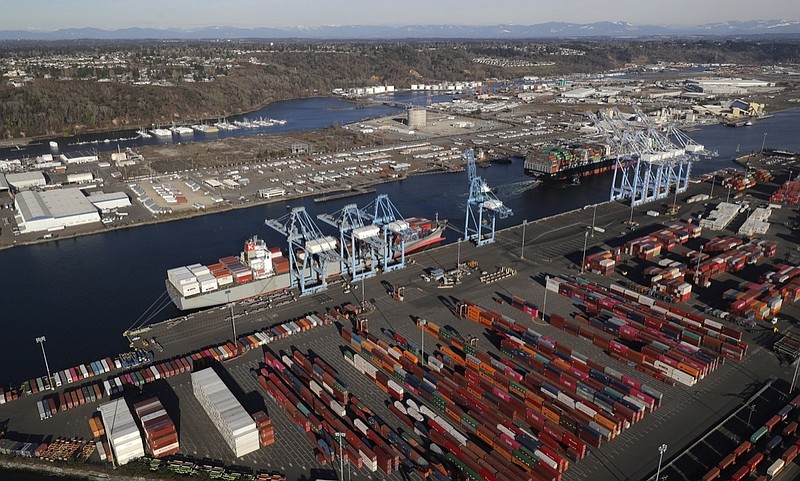When President Donald Trump began talking about tariffs in 2017, Upper Midwest soybean farmer Jamie Beyer suspected that her crop could become a weapon. Two years later, she and her family are watching the commodity markets on an hourly basis as an escalating trade war between the U.S. and China creates turmoil in rural America.
"It's hard to concentrate on planting when you're constantly checking your phone to see if another (Trump) tweet has prompted a dip in the market," said Beyer, of Wheaton, Minnesota. Beyer's family farms about 3,500 acres in Minnesota and South Dakota and she figures it has lost about $230,000 because of the trade war.
These are days of "a little bit of panic" among farmers, she said, and the anxiety is spreading to the agricultural lending industry. One economist said the farm sector might face its greatest downturn in three decades.
Soybean prices plunged early this week to a 10-year low after Trump's decision late last week to impose punitive duties on $200 billion of imports from China and China's retaliatory tariff hikes Monday on $60 billion of American goods. U.S. officials then listed $300 billion more of Chinese goods for possible tariff hikes, and China on Tuesday vowed to "fight to the finish."
The trade war that began last summer has already hurt farmers, despite $11 billion in relief payments that were doled out last year by the federal government. The personal income of farmers declined by $11.8 billion through the first three months of 2019, according to the U.S. Commerce Department. A similar pace of decline is expected in the coming months, according to the Federal Reserve Bank of Kansas City.
"The domestic stress caused by the administration's trade policy is nowhere more evident than in the agricultural sector," said Joseph Brusuelas, chief economist at the consultant RSM. "Should the current policy pathway not be changed, the farm sector is going to experience the greatest downturn since the late 1980s, driven by widespread bankruptcies and consolidation."
During the farm credit crisis of the 1980s, high interest rates and falling land prices led to widespread farm foreclosures. One positive difference now is that land and farm asset values have been holding their own, and "overall, farm balance sheets look pretty good," said Kent Thiesse, senior vice president and farm management analyst at MinnStar Bank in Lake Crystal, Minnesota.
But working capital is becoming a problem, as the trade war comes after recent poor crop years in some areas. Most farmers were able to get financing to plant a crop this spring, thanks in part to the federal relief payments, but "if there's no government assistance this year we're going to be looking at some serious losses by fall," Thiesse said.
Trump said Monday that more aid is planned. That could be key to some farmers.
Southwest Georgia farmer Jimmy Webb said he is for the fight, though he knows what the short-term result could be.
"Well, it's going to have a negative impact on prices until something gets worked out," he said.
He is in the middle of planting 2,000 acres of cotton and 1,000 acres of peanuts.
"Anytime something political gets involved in trade, it's never going to be good," Webb said.
Georgia farmers were already hurt last year when China imposed tariffs of 5% to 10% on many American products in the first round of the trade war. Then they suffered when Hurricane Michael swept through, destroying more than $2 billion of crops.
"Would farm families love for this to be over yesterday? Certainly. Should China cease retaliatory and illegal trade practices? Most definitely," Georgia Agriculture Commissioner Gary Black wrote in an emailed response to questions from The Atlanta Journal-Constitution.
"Targeting farmers as a tool of state is never acceptable. Hopefully our good customers will return to negotiations soon," Black added in the email. "In the meantime, their consumers and our farmers are the ones who will suffer."
Soybean prices rose a bit on Tuesday, but farmer fear a prolonged trade battle could undermine one of the biggest markets for American farmers.
"The soybean market in China took us more than 40 years to build, and as this confrontation continues, it will become increasingly difficult to recover," said American Soybean Association President Davie Stevens, who farms soybeans in Kentucky. "With depressed prices and unsold stocks expected to double by the 2019 harvest, soybean farmers are not willing to be collateral damage in an endless tariff war."
